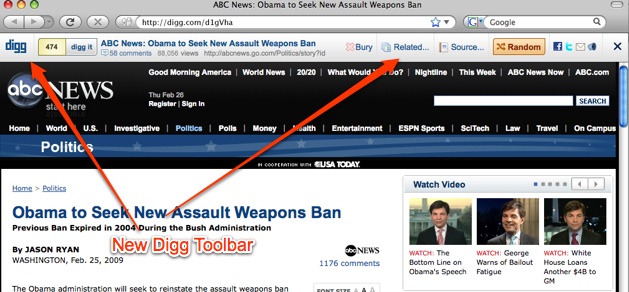
A super-secret Digg toolbar has been spotted in the wild. We tracked down a beta tester who gave us the skinny on its features. The toolbar lets you Digg or Bury the page you are on, and shows how many Diggs it has already received. There are also links to show related pages, as well as more pages from the same source voted highly by the Digg community or marked as up and coming.
Then there is the “Random” button which works like StumbleUpon. It takes you to a randomly-generated page based on your past input and overall Digg voting. By the prominence of this button, it appears that is a feature Digg will be trying to highlight. Users can also share the page via Facebook, Twitter, or email via icons at the top. A drawer slides down to expose additional functionality.
Now, here where it gets interesting. For each page, the toolbar creates a shortened URL similar to TinyURL or bit.ly that starts instead with http://digg.com/. . . followed by a six-character code such as “http://digg.com/d1gVha.” When you share a page via Twitter or Facebook, it is that shortened URL which is used. And in fact, for the beta testers, the toolbar can be wrapped around any page simply by sticking “http://digg.com/” in front of any URL, which then gets converted into a shortened version. This technique works for pages that have never been Dugg as well. I could see this feature eventually showing up as part of a browser add-on so that Digg URL’s could be created with one click.
The toolbar is not an add-on to existing browsers. It is actually creating a large i-frame around the original Webpage and delivering it on the Digg.com domain. Users can click on an X to get rid of the toolbar frame and be taken to the original page, and the original page gets the hit as well. (This is a similar technique to what Ginx does with its Web-sharing Twitter client). But by running all of the recommended pages through its own domain, Digg can run all sorts of analytics on each page such as how many people viewed it, where people clicked to next, and so on.
It is amazing that Twitter has single-handedly created this need for shortened URLs and that a relatively large player like Digg now wants a piece of that market.
Click on the screenshot below for a larger image:
